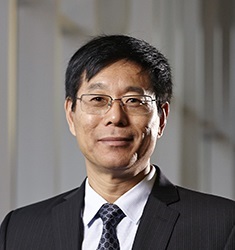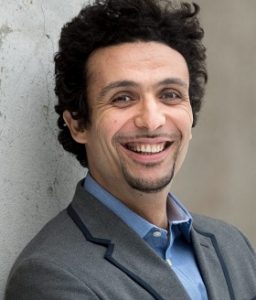
Prof. Qing-Long Han
Distinguished Professor, PhD, FIEEE, FIEAust
Pro Vice-Chancellor (Research Quality)
Swinburne University of Technology
Melbourne, Vic 3122, Australia
Tel.: +613 9214 3808
Email: [email protected]
Title: Multi-Agent Systems Based Distributed Control, Optimization and Energy Management in Smart Grids
Bio:
Professor Han is Pro Vice-Chancellor (Research Quality) and a Distinguished Professor at Swinburne University of Technology, Melbourne, Australia. He held various academic and management positions at Griffith University and Central Queensland University, Australia. He received the Ph.D. degree in Control Engineering from East China University of Science and Technology in 1997.
Professor Han was a Highly Cited Researcher in both Essential Science Indicator fields of Engineering and Computer Science (Clarivate Analytics, 2019-2020). He is the winner of 2021 M.A. Sargent Medal, which is awarded by Engineers Australia for longstanding eminence in science or practice of electrical engineering. He was one of Australia’s Top 5 Lifetime Achievers (Research Superstars) in the discipline area of Engineering and Computer Science Engineering and Computer Science (The Australian’s Research Magazine, 2019-2020). He was in the Top 19 and Top 13 in the total researchers (87,535) in the world within the field of Industrial Engineering & Automation for career-long citation impact up until the end of 2019 and for citation impact during the single calendar year 2019, respectively, in the Stanford University’s Top 2% of the Most-Cited Scientists.
Professor Han was the recipient of The 2020 IEEE Systems, Man, and Cybernetics (SMC) Society Andrew P. Sage Best Transactions Paper Award, The 2020 IEEE Transactions on Industrial Informatics Outstanding Paper Award, The 2019 IEEE SMC Society Andrew P. Sage Best Transactions Paper Award, The 2020 IET Control Theory and Applications Premium (Best Paper) Award, and The 2016 IET Control Theory and Applications Premium (Best Paper) Award.
Professor Han is a Fellow of The Institute of Electrical and Electronic Engineers and The Institution of Engineers Australia. He has served as an AdCom Member of IEEE Industrial Electronics Society (IES), a Member of IEEE IES Fellow Committee, and Chair of IEEE IES Technical Committee on Networked Control Systems. He has served as Co-Editor for Australian Journal of Electrical & Electronics Engineering, an Associate Editor for 12 International Journals and a Guest Editor for 13 Special Issues.
Since 2001, as of 21 March 2021, Professor Han has authored or co-authored three hundred and twenty-one (321) fully-refereed high quality journal articles including thirty-seven (37) articles in Automatica, twenty-three (23) articles in IEEE Transactions on Automatic Control, fifty-seven (57) articles in IEEE Transactions on Cybernetics (No. 1 in the JCR® category of 63 journals in AUTOMATION & CONTROL SYSTEMS), and eighty-three (83) articles in other most prestigious IEEE Transactions. He has also authored or co-authored one hundred and eighty-three (183) international leading conference papers, five (5) monographs, one (1) research-based book chapter, and edited four (4) conference proceedings and ten (10) special issues.
As of 21 March 2021, Professor Han’s research work has been cited 30,520 times with an h-index of 96, an i10-index of 285 according to Google Scholar. Furthermore, his research work has been cited 24,827 times with an h-index of 87 according to SCOPUS, and 21,497 times with an h-index of 83 according to Clarivate Analytics Web of Science Core Collection.
Abstract:
With the widespread integration of renewable distributed energy sources such as wind generation, photovoltaic and solar panels, a traditional electrical network has been experiencing a huge revolution towards a smart grid in various terms of generation, transmission, distribution and usage, and so on. Such a revolution poses new theoretical and technical challenges in operation and management of smart grids. To address these challenges, a multi-agent system based strategy is developed to address control and optimization issues in smart grids, showcasing its strong ability in improving efficiency, reliability and scalability. In this talk, some backgrounds on smart grids from the perspective of multi-agent systems are introduced. Second, a distributed secondary control scheme with an event-triggered communication mechanism is presented to ensure frequency regulation and active power sharing of AC islanded microgrids while significantly reducing the utilization of communication resources. Third, a multi-objective distributed optimization method is provided to address current sharing and voltage regulation in DC microgrids. Furthermore, a distributed energy management issue of smart grids maximizing the total social welfare that balances generation-side expanses, user-side payments, and transmission line costs is addressed. Finally, some challenging issues are discussed for future investigation.

Assoc. Prof. Mehdi Bennis
Title: Communication-efficient and distributed ML over wireless networks
Bio:
Dr. Mehdi Bennis is an Associate Professor at the Centre for Wireless Communications, University of Oulu, Finland, an Academy of Finland Research Fellow, and head of the intelligent connectivity and networks/systems group (ICON). His main research interests are radio resource management, heterogeneous networks, game theory, and machine learning in 5G networks and beyond. He has co-authored one book and published more than 200 research papers in international conferences, journals, and book chapters. He has been the recipient of several prestigious awards including the 2015 Fred W. Ellersick Prize from the IEEE Communications Society, the 2016 Best Tutorial Prize from the IEEE Communications Society, the 2017 EURASIP Best Paper Award for the Journal of Wireless Communications and Networks, the all-University of Oulu award for research and in 2019 Dr Bennis received the IEEE ComSoc Radio Communications Committee Early Achievement Awar. Dr Bennis is an IEEE Fellow.
Abstract:
Breakthroughs in machine learning (ML) and particularly deep learning have transformed every aspects of our lives from face recognition, medical diagnosis, and natural language processing. This progress has been fueled mainly by the availability of more data and more computing power. However, the current premise in classical ML is based on a single node in a centralized and remote data center with full access to a global dataset and a massive amount of storage and computing. Nevertheless, the advent of a new breed of intelligent devices ranging from drones to self-driving vehicles, makes cloud-based ML inadequate. This talk will present the vision of distributed edge intelligence featuring key enablers, architectures, algorithms and some recent results.

